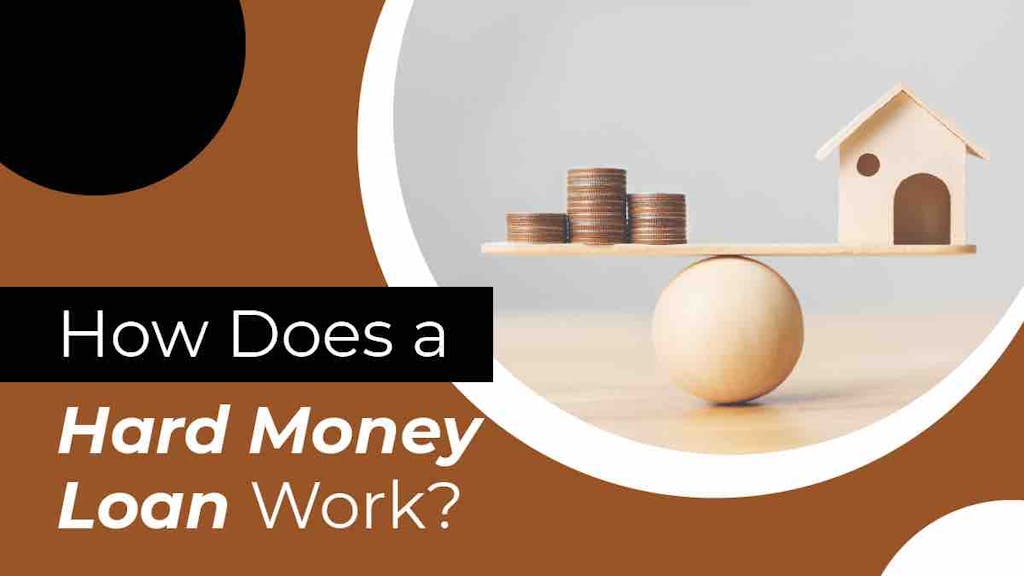How Does a Hard Money Loan Work?

Hard money loans are ideal for real estate investors who want to rehab and flip undervalued properties or take advantage of the brrrr (buy, renovate, rent, refinance, repeat) method. But what, exactly, is a hard money loan – and how is it different from a conventional real estate loan?
Hard Money Lending for Beginners
A hard money loan is a popular alternative to conventional mortgage loans, especially for borrowers looking to renovate then resell investment properties or to renovate then create rental properties.
What is a Hard Money Loan?
Sometimes called a bridge loan, a hard money loan is a short-term loan offered by private lenders, not by traditional financial institutions. These loans can typically be obtained more quickly than a conventional loan, and often without a large down payment.
A hard money loan is a collateral-backed loan, secured by the real estate being purchased. The size of the loan is determined by the estimated value of the property after proposed repairs are made.
One of the main purposes of a hard money loan is to finance upgrades to property that will increase the value for the end sale or to keep as a rental.
Most hard money loans have a term of six to twelve months, although in some instances, longer terms can be arranged. The borrower makes a monthly payment to the lender, typically an interest-only payment.
Hard Money Loans: An Example
Here’s how a typical hard money loan works:
- The borrower wants to purchase a fixer-upper for $100,000. The estimate for renovation costs is $30,000, and it’s projected the rehabbed property can be sold for $180,000.
- In this example, the hard money lender will lend 70% of the home’s projected value after repairs. That’s 70% of $180,000, or $126,000. The borrower will need to make a $4,000 down payment, plus pay approx $1000 in lender fees and 3 points origination, which is a middle of the road origination charge in most markets. This totals $8,780 up-front. Keep in mind that some lenders will require more money in the deal, and ask for a minimum down payment of 10-20%. It can be advantageous for the investor to seek out the lenders that require minimal down payment options to reduce their cash to close. There will also be the typical title fees associated with closing a transaction.
- On this loan, if the lender charges 12% interest, then the borrower makes interest-only payments of $1260 per month. Make sure to check with the hard money lender to see if there are prepayment penalties charged or a minimum yield they require.
- Assuming you are in the loan for 3 months, and the property sells for the projected $180,000, the investor makes a profit of $25,000. If the property sells for more than $180,000, the buyer makes even more money.
(Use this hard money loan calculator to calculate the costs for specific investment opportunities.)
Who Should Use a Hard Money Loan – and Why?
A hard money loan isn’t for everyone. Because of the shorter term and high interest rates, there generally needs to be renovation and upside equity to capture, whether its a flip or rental property.
First, a hard money loan is ideal for a buyer who wants to fix and flip an undervalued property within a relatively short period of time. A hard money loan enables such a borrower to obtain the property without going through all the hassles of a conventional loan – and to obtain that loan relatively quickly. Instead of the normal 2-3 months to close a traditional mortgage, a hard money loan can typically be closed within a matter of a couple of weeks or less.
Hard money loans are also good for borrowers who may not have W2 jobs or tons of reserves in the bank. Because hard money loans are typically used to finance rehab properties, a hard money lender is more interested in the property’s value than some of the standard guidelines used by traditional lenders. Hard money lenders will lend as much money as the rehabbed property is worth.
In addition, some borrowers use hard money loans to bridge the gap between the purchase of an investment property and the procurement of longer-term financing. These buy-and-hold investors use the hard money to acquire and renovate properties that they then refinance with traditional loans and manage as rental properties.
How Hard Money Loans Work
Borrowers used to conventional long-term loans might find a hard money loan to be a foreign concept or different sort of animal. It is important to know how hard money loans work – and how they differ from conventional loans.
Who Lends Hard Money?
Banks and other conventional financial institutions originate most long-term loans and mortgages. These conventional lenders do not often deal in hard money loans. Instead, hard money loans are issued by private investors, funds or brokers who ultimately source the deals from the private investors or funds.
These private lenders are in the hard money market because they want a higher rate of return on their money and are willing to assume a higher degree of risk. Borrowers pay a higher rate of interest for a hard money loan because they don’t have to jump through all the hoops required by conventional lenders as well as receiving more funds towards the purchase price and renovation.
What Are the Requirements For a Hard Money Loan?
Hard money lenders look at the property, as well as the borrower’s plans to increase the property’s value and pay off the loan. While most Lenders are still concerned with the borrower’s credit rating, in general the underwriting guidelines are far less stringent.
When applying for a hard money loan, borrowers need to prove that they have enough capital to successfully get through a deal. Having previous real estate experience is also a plus.
What are LTV and ARV?
When considering how much money to lend, many hard money lenders consider the After Repaired Value (ARV) of the property – that is, the estimated value of the property after all improvements have been made. These hard money lenders typically lend up to 70% of the property’s ARV, but not more than 100% of the purchase price.
Do Hard Money Lenders Check Credit?
Most hard money lenders perform credit checks as part of their due diligence process. The lender wants to be assured that the borrower has the ability to pay back the loan. However, the applicant’s credit score plays a considerably smaller role in the approval process than it does for a conventional loan, as hard money lenders place a higher importance on the potential value of the property. That said, a borrower with a low credit score may be asked to pay a higher rate of interest.
What is the Duration of a Typical Hard Money Loan?
A hard money loan is a short-term loan. Most hard money loans run in duration from three months to a year, although some lenders offer longer terms based on the size of the renovation and project.
What is the Average Interest Rate on a Hard Money Loan?
The interest rates charged for a hard money loan vary from lender-to-lender and deal-to-deal. Since hard money lenders assume more risk than conventional lenders, however, rates for hard money loans are higher than rates for comparable conventional loans.
In most areas, interest rates on hard money loans run from 10% to 15%. In addition, a borrower may need to pay 3 to 5 points, based on the total loan amount, plus any applicable appraisal, inspection, and administrative fees.
What Are the Monthly Payments on a Hard Money Loan?
Many hard money lenders require interest-only payments during the short duration of the loan. A balloon payment of the loan principle is due at the end of the loan term.
Do Hard Money Lenders Require a Down Payment?
Most hard money lenders require some sort of a down payment. A few select lenders will lend up to 100% of the purchase price of the property, based on a percentage of the property’s ARV.
Other hard money lenders require a specific LTV ratio, sometimes based on the purchase price plus rehab costs, with the remainder due as a down payment. Still, others may want a fixed down payment percentage, typically around 10-20% of the property’s appraised value.
How Do Hard Money Lenders Make Money?
Hard money lenders make their money from the interest, points, and fees charged to the borrower. These lenders look to make a quick turnaround on their investment, thus the higher interest rates and shorter terms of hard money loans.
Is a Hard Money Loan a Good Idea?
A hard money loan is a good idea if a borrower needs money quickly to invest in a property that can be rehabbed and flipped, or rehabbed, rented and refinanced in a relatively short period of time. Hard money loans can be secured much faster than conventional loans and don’t require lengthy underwriting guidelines. They’re also good for investors who don’t have a lot of collateral; the property itself becomes the collateral for the loan.
Hard money loans, however, are not ideal for traditional homeowners wanting to finance a property long-term. They are a useful tool in the investors toolbelt when it comes to leveraging money to scale their business. This ultimately means they can do more deals in a given year regardless of the investors strategy of flipping homes or creating a rental portfolio.


